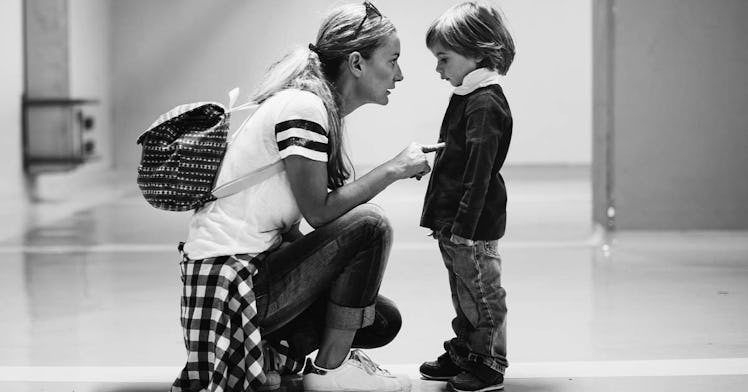Global Study Shows Spanking Kids Is Bad — But That Most Discipline Is, Too
Listening, loving and spending time with your kids could be more effective at curbing bad behavior than punishing them.

A global study has found that spanking children is terrible for kids — and that harsh verbal discipline is, too. What gives?
Good communication is crucial to so many aspects of life, including maintaining a healthy marriage parenting well. One recent study from the University of Michigan underscores the lasting effects that (mainly bad) communication has on kids’ lives. The results affirm that, for parents, learning how to effectively communicate with their kids in a calm, non-aggressive fashion, especially when they’ve done something wrong or non-agreeable, is vital for kids’ positive developmental outcomes.
What does this mean exactly? Researchers are now suggesting that verbal discipline often doesn’t work the way parents may hope if parents are “loud and abrupt” when they talk to their children. AKA, yelling at your kid doesn’t work. A new study from the University of Michigan examined different kinds of punishments related to kids’ behaviors in a sample of 216,000 families from 62 countries, using data from the United Nations Children’s Fund Multiple Indicator Cluster Surveys. The study looked at forms of violent discipline, such as spanking, and nonviolent discipline, including taking away privileges as well as verbal reasoning, i.e. telling kids what they did wrong.
Previous research has basically definitively proven that spanking as a form of discipline yields negative results. UMich states: “Research has continually shown that spanking leads to negative child outcomes, such as aggression and distraction, regardless of the context in which children are disciplined, including country, race and ethnicity, and neighborhood.” This study reinforced that point, showing that spanking can lead kids to be more distracted and aggressive, and less social.
But, perhaps a bit more surprisingly, nonviolent punishment had mixed results. Some nonviolent punishment led to an increase in distraction and aggression, but could also an increase in prosocial behavior. Additionally, when parents employed verbal reasoning with their kids, it sometimes led to an increase in aggressive behavior, particularly if the parents used harsh and aggressive language.
According to Andrew Grogan-Kaylor, a professor of social work at the University of Michigan who co-authored the findings in the journal, International Journal of Behavioral Development, “Positive discipline doesn’t always seem to have all that many positive benefits.” Grogan-Kaylor continues, “It’s more likely that the long-term investments that parents make in children, such as spending time with them, letting them know they are loved and listening to them, have more positive effects than nonviolent discipline,” adding, “This has yet to be thoroughly researched in a global context.”
Following this study, it would seem that some tenants of conventional discipline, and their supposed efficacy, could be put into doubt. But how should parents discipline their kids going forward? Grogan-Kaylor suggests that parents find ways to make communication with their kids open and accessible, establish structure and figure out a way to remove kids’ privileges in an appropriate way that’s in line with their age and development. This study is a reminder that the tone and language parents take with their kids can be just as important as what parents actually say — and is extra encouragement for parents to stay calm even when kids may sometimes test their patience.
This article was originally published on